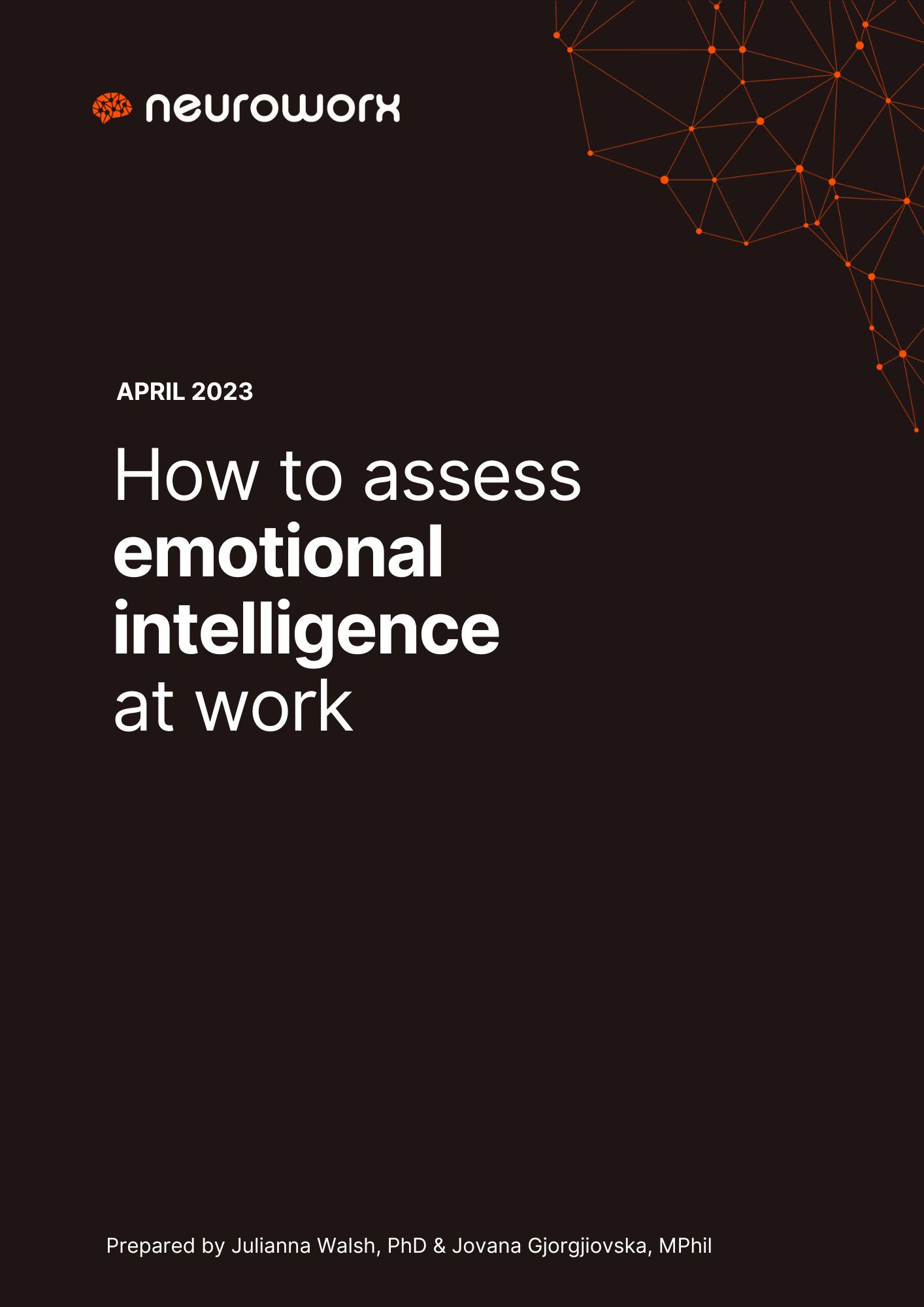How To Assess Emotional Intelligence At Work
Discover the importance of emotional intelligence in the workplace and how it can drive business success.
What's Inside?
The criticality of emotional intelligence (EI) for employees and leaders has been on the rise since the pandemic and will continue to grow with the increasing prevalence of automation in the workplace.
This white paper reviews research in this area and provides practical advice for assessing and developing EI. Results from a recent study we conducted indicate the importance of emotion-related abilities in the workplace. In brief, participants with high EI also reported:
- Less fatigue and emotional depletion from work
- Less time spent complaining or wasting company resources
- Stronger remote work effectiveness
- More persistence in the face of challenges at work
- And much more!
What is EI?
Emotional intelligence (EI) refers to the ability to identify, understand, and manage one's own emotions as well as those of others. It involves the capacity to recognize and regulate emotions, empathize with others, and use emotions to guide thought and behavior.
EI is a critical skill in both personal and professional contexts, as it influences the quality of our relationships, decision-making, and overall well-being.
The concept of emotional intelligence was first introduced in the article Emotional Intelligence (1990) by psychologists Peter Salovey and John Mayer, who defined it as "the ability to perceive emotions, to access and generate emotions so as to assist thought, to understand emotions and emotional knowledge, and to reflectively regulate emotions so as to promote emotional and intellectual growth."
Why is EI important at work?
Emotional intelligence is essential in the workplace because it helps individuals to better understand and manage their own emotions and the emotions of others. This skill is especially critical in today's fast-paced and highly competitive work environment, where collaboration, communication, and teamwork are increasingly essential.
Some of the reasons why EI is important in the workplace include:
- Communication skills: individuals with high EI can communicate more effectively with their colleagues, supervisors, and customers. They are better able to express their thoughts and feelings in a clear and concise manner and are more adept at actively listening to others.
- Conflict resolution: EI helps individuals to better manage conflict and resolve disputes in a constructive and collaborative manner. It enables individuals to respond to difficult situations with empathy and understanding, rather than reacting impulsively or defensively.
- Leadership skills: leaders with high EI are better able to motivate and inspire their team members, build strong relationships, and create a positive and supportive work environment. They can provide constructive feedback, listen actively to their employees' concerns, and adapt their leadership style to different personalities and situations.
- Stress management: individuals with high EI are better able to manage stress and maintain their composure in challenging situations. This skill is especially critical in high-pressure work environments, where the ability to stay calm and focused can make a significant difference in performance.
Signs of high EI at work
Employees who possess high emotional intelligence are often more successful in their jobs, and can make a significant impact on their teams and organizations.
Here's an overview of some of the signs of high EI at work.
1. Good communication skills
Effective communication involves more than just conveying information. It also requires being able to understand and respond to the emotions of others, which is a key component of EI.
Individuals with high EI communicate their thoughts and feelings in a clear, respectful, and empathetic manner. They listen actively to others, which helps to build stronger relationships and promote better collaboration and teamwork.
2. Self-awareness
Self-awareness involves being able to recognize and understand one's own emotions, thoughts, and behaviors. Employees with high EI reflect on their own emotions and how they impact their work. This results in making better decisions, setting more realistic goals and prioritizing time and resources more efficiently.
Self-aware employees also receive feedback more effectively. They listen to constructive feedback without becoming defensive or emotional. Then they use that feedback to learn and grow, which is essential for personal and professional development.
3. Adaptability
Adaptability is a sign of high emotional intelligence at work because it involves the ability to adjust to changing situations, personalities, and environments. Employees with high EI are able to adapt their behavior to different situations and personalities, which helps to promote better collaboration and teamwork.
In addition, adaptable employees are more resilient in the face of change. They navigate change more effectively and are better able to cope with stress and uncertainty.
4. Empathy
Empathy, the ability to understand and share the feelings of others, is closely related to emotional intelligence. Employees who are empathetic are able to connect with their colleagues on a deeper level, leading to better communication and more effective collaboration.
Empathetic individuals are often seen as strong leaders because they have an innate understanding of how their team members feel and think. They can use this knowledge to motivate and inspire their coworkers while also providing support when needed.
5. Self-motivation
Self-motivation is another key aspect of an individual's behavior at work which is closely related to high emotional intelligence. Because individuals with high EI have a better understanding of how their emotions impact their behavior, they are better able to manage and use them to their own benefit. Such individuals appear more able to stay on track to meet goals and bounce back from failure.
Stronger emotion-related abilities equip these employees to handle potential derailers. They know how to stay focused on tasks despite distractions, setbacks, or roadblocks. This reflects a certain level of emotional maturity as it involves controlling one's impulses and staying positive even when faced with challenges.
Recruiting for high EI
EI is not always easy to identify during the recruitment process. While technical skills and experience can be measured and quantified, EI is more subjective and difficult to assess. It can be hard to gauge how an individual will handle stress, conflict, or emotional situations based on a resume or interview alone.
Our team has created a comprehensive PDF guide that provides invaluable insights and strategies for recruiting individuals with high EI. Download our PDF guide today and take the first step toward building your dream team.
Other useful emotional intelligence resources
Want to learn more about emotional intelligence? Here are a few additional resources:

Boost your hiring power.
Start using Neuroworx today.
Talk is cheap. We offer a 14-day free trial so you can see our platform for yourselves.
Try for free